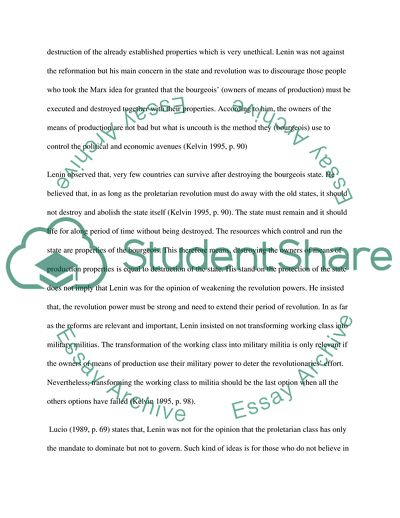Cite this document
(Lenin State and Revolution Literature review Example | Topics and Well Written Essays - 3250 words, n.d.)
Lenin State and Revolution Literature review Example | Topics and Well Written Essays - 3250 words. https://studentshare.org/history/1768949-what-are-the-main-arguments-in-lenins-state-and-revolution-to-what-extent-do-they-make-a-distinctive-contribution-to-marxist-thought
Lenin State and Revolution Literature review Example | Topics and Well Written Essays - 3250 words. https://studentshare.org/history/1768949-what-are-the-main-arguments-in-lenins-state-and-revolution-to-what-extent-do-they-make-a-distinctive-contribution-to-marxist-thought
(Lenin State and Revolution Literature Review Example | Topics and Well Written Essays - 3250 Words)
Lenin State and Revolution Literature Review Example | Topics and Well Written Essays - 3250 Words. https://studentshare.org/history/1768949-what-are-the-main-arguments-in-lenins-state-and-revolution-to-what-extent-do-they-make-a-distinctive-contribution-to-marxist-thought.
Lenin State and Revolution Literature Review Example | Topics and Well Written Essays - 3250 Words. https://studentshare.org/history/1768949-what-are-the-main-arguments-in-lenins-state-and-revolution-to-what-extent-do-they-make-a-distinctive-contribution-to-marxist-thought.
“Lenin State and Revolution Literature Review Example | Topics and Well Written Essays - 3250 Words”. https://studentshare.org/history/1768949-what-are-the-main-arguments-in-lenins-state-and-revolution-to-what-extent-do-they-make-a-distinctive-contribution-to-marxist-thought.


